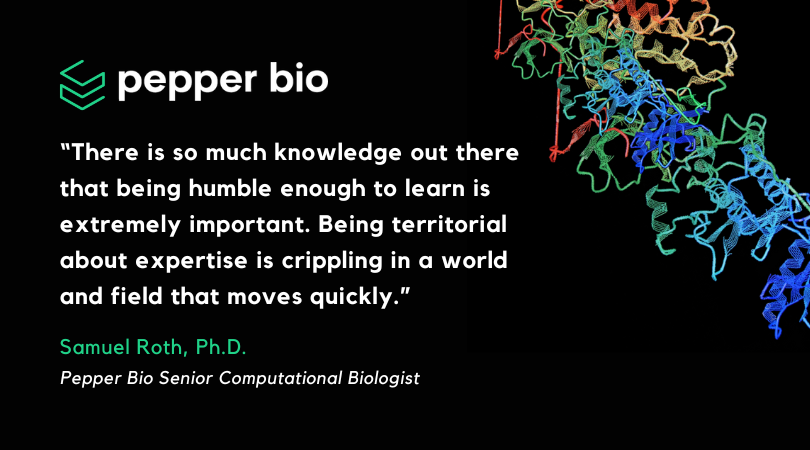Please welcome the newest member of the Pepper Bio team, Sam Roth! Sam joins us from a role at Fulcrum Therapeutics, where he focused on developing computational methods for analyzing NGS data with the aim of target discovery in rare genetic disease.
Sam’s first day at Pepper as a Senior Computational Biologist was just over a week ago. You can learn more about why Sam joined our team, as well as more about his background, passions, and outlook on biotech trends, below:
What led you to computational biology?
“I wanted to do research as an undergraduate because I knew it would position me well for medical school. During my freshman year, I was in a small, specialized section of introductory biology with Dr. Michael Weir. When I asked about entering his lab, he said he had more space for a computational researcher than another wet lab researcher. He suggested I take introductory programming in the spring to revisit this potential appointment. I fell in love with the problem-solving of computer science and noticed that the computational biologists were often most enthusiastic about their research problems. Working for Dr. Weir over the summer was better than any other job I had worked.“
What excites you most about Pepper’s technology?
“My biggest source of excitement with Pepper’s technology is the ability to use cutting-edge science to help patients. Often, there is a gap between the innovation in academia and the applied impact on patients. That was certainly the case for my doctoral research. Pepper’s transomic technology allows us to apply innovative science directly to problems that will improve patients’ lives, which is my main passion in industry.“
What do you hope to learn from working with Samantha, Jon, and the rest of the Pepper team?
“Anything and everything! I’m still relatively young in my industry career, so I am excited about all aspects. I want to learn all about the science and how to push it forward as a business. I’m very passionate about science (otherwise, why get a Ph.D.?), but I’m equally interested in melding it with good business practices to help patients.”
Do you have any personal connection to Pepper’s mission of treating untreatable disease?
“My brother has a yet undiagnosed autoimmune and connective tissue condition that would benefit greatly from a treatment or cure. He has had over a dozen surgeries in the past decade, and that is not a pleasant experience, to say the least. His experience has led to my interest in supporting patients whose diseases don’t yet have available treatments.”
Moving from academia to industry comes with unique challenges and benefits: why did you jump, and what excites you most about working at a startup?
“I made the choice to enter industry for several reasons. The main reason was to have a connection to patients. While my research focused on infectious disease, it is not directly applicable to patient care. That connection to human well-being is a significant personal value of mine. Another reason was that I wanted to go into a business setting: my parents are both business people. My mom owns a small business, while my dad is a business investment attorney. Sunday dinners were extremely educational about how businesses work. The dual purpose of a startup focused on science allows for scientific expertise contributions, as well as involvement in business. Additionally, I thrive in collaborative environments, which are inherent to startups, so this environment will play to many of my strengths.”
What advice would you give to others looking to follow in your footsteps?
“It is a cliche, but humility and work ethic will take you far in science. There is so much knowledge out there that being humble enough to learn is extremely important. Being territorial about expertise is crippling in a world and field that moves quickly. As for work ethic, that is almost self-explanatory. Science is the same as any field. The only way to improve and excel is to work hard.”
What trends in biotech are you most excited about right now?
“I think the application of machine learning in order to deliver actionable insights is the most exciting development in biotech right now. In computational biology, there seems to be a movement towards interpretable outputs from these algorithms rather than simply emphasizing performance. With biological interpretation, the power of machine learning techniques will lend insights that will transform biotech as a whole.”
More about Sam’s background and education:
As a child, Samuel Roth, Ph.D., excelled at science and mathematics. After graduating from his Wilmette, IL, high school, he chose to pursue medical studies (and a collegiate athletic career on the cross country and track and field teams) at Wesleyan University – the #1 funded research program among liberal arts colleges for the sciences.
At Wesleyan, Sam earned his BA and MA. He worked in Dr. Michael Weir’s lab from the summer after his freshman year through his Master’s, where he focused on applying computational analysis techniques to assess tandem mass spectrometry peptide detection.
Sam then earned his Ph.D. at the University of California San Diego while conducting bioinformatics and systems biology research under Chris Benner. Also while at UCSD, Sam developed an innovative software tool called ARTDeco, which enabled the characterization and quantification of readthrough transcription in influenza virus as well as several other viruses where the phenotype hadn’t been observed.


